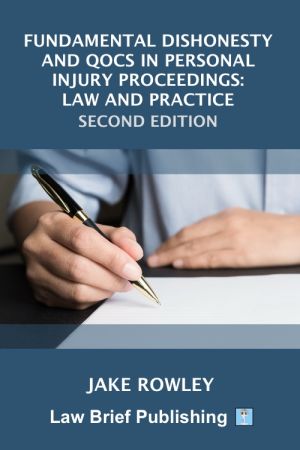
Dishonest personal injury claims have long been, and remain, a well-recognised and extensive problem. Allegations of ‘fundamental dishonesty’ are, almost certainly, as prevalent as ever. It is no exaggeration to say that every practitioner involved in personal injury litigation must possess a comprehensive and up to date understanding of the law relating to ‘fundamental dishonesty’: first, as it relates to s. 57 of the Criminal Justice and Courts Act 2015 and secondly, in relation to the exception it provides to the Qualified One-Way Costs Shifting (“QOCS”) regime. It is simply not possible to carry on practice in this area of law without an intimate working knowledge of these principles and how they apply in real terms.
Since the first edition of this work was published in 2020 the law has continued to develop at pace, particularly in relation to the operation of s. 57 of the 2015 Act. How s. 57 of the 2015 Act works in practice; what the Court is actually required to dismiss where s. 57 is satisfied; and the meaning of ‘substantial injustice’, have all been explored and explained by the Courts. Other interesting and novel issues have arisen and been argued before the Judges, including: what the Court should do in relation to the costs of a spilt trial where liability is resolved in the Claimant’s favour, but dishonesty is alleged in relation to quantum; and how allegations of ‘fundamental dishonesty’ interact with Court’s jurisdiction to award an interim payment. In the costs arena, the introduction of the Intermediate Track and the attendant wholesale rewriting of the fixed costs Rules have required practitioners to familiarise themselves with new procedural routes to assessing their enforceable costs orders, and the Court of Appeal has given guidance on the likely basis of costs assessment where allegations of ‘fundamental dishonesty’ are pursued unsuccessfully.
Practitioners are increasingly familiar with the issues surrounding these important legal topics. However, to consider the law in this area as completely settled would be a mistake. There continue to be important issues which are not entirely resolved (notably including precisely what the Court can/must take into account when considering whether a Claimant has established ‘substantial injustice’ within the meaning of s. 57 of the 2015 Act) and as the interceding five years since the first edition of this work was published have shown, there always remain other novel points which are still yet to be identified but will ultimately end up being argued before the Courts as the precise limits of the jurisprudence relating to ‘fundamental dishonesty’ are tested and its interaction with other areas of civil practice explored.
There has never been a better time to take stock on where the law on ‘fundamental dishonesty’ is right now.